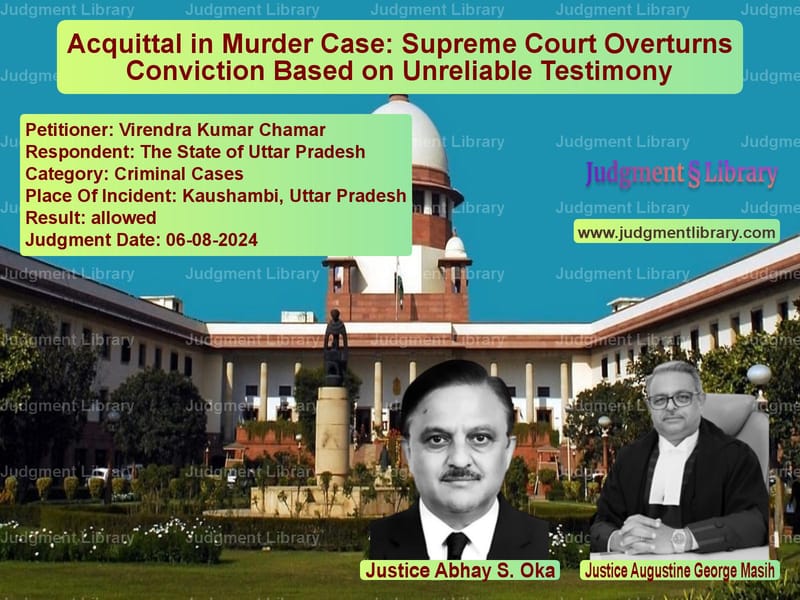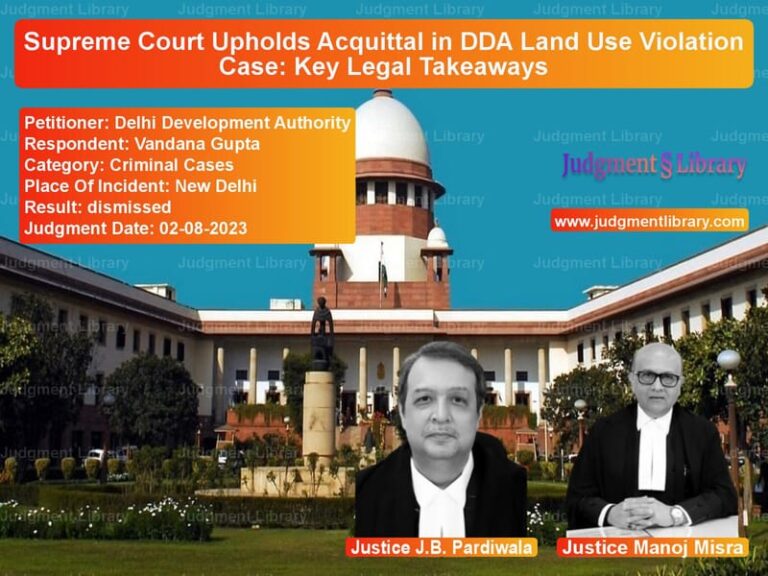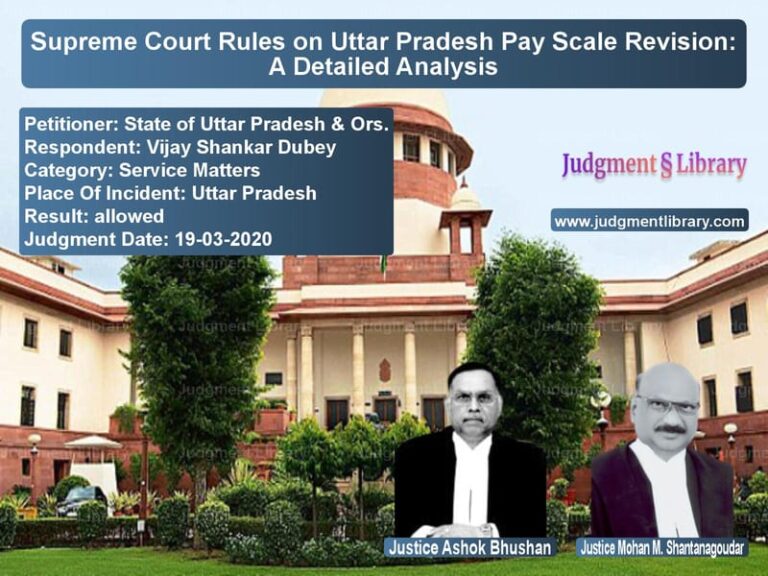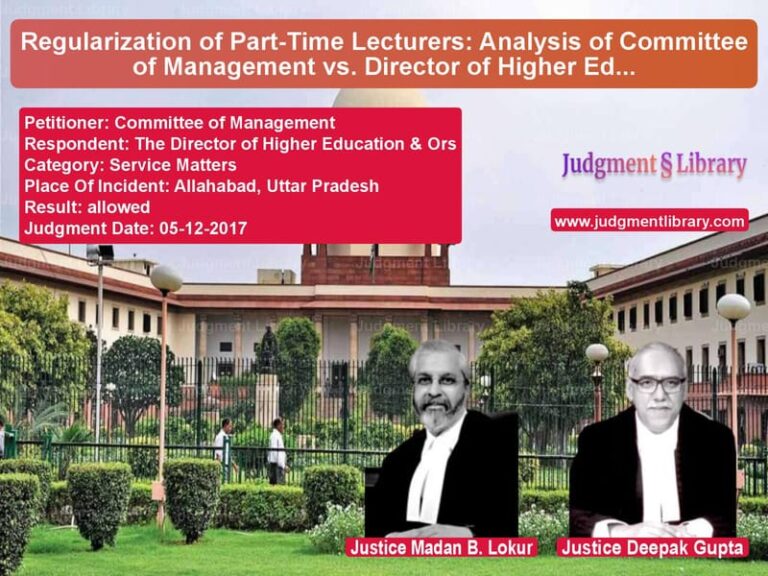Acquittal in Murder Case: Supreme Court Overturns Conviction Based on Unreliable Testimony
The Supreme Court of India recently overturned the conviction of Virendra Kumar Chamar, who was accused of murder under Section 302 of the Indian Penal Code (IPC). The case revolved around the tragic death of Harilal, allegedly at the hands of multiple accused. The primary basis for the conviction was the testimony of a single eyewitness, whose statements in cross-examination raised serious doubts about his credibility. This blog delves into the court’s reasoning, the arguments presented by both parties, and the significance of this judgment.
Background of the Case
The case dates back to June 20, 2005, when Harilal was allegedly attacked by three individuals—accused Nos. 1 and 2, who fired gunshots, and accused No. 3 (the appellant), who wielded a knife. The complainant, Jaggilal, who was the deceased’s brother, lodged the First Information Report (FIR). However, he passed away before the trial commenced. The prosecution relied primarily on the testimony of another brother, PW1—Ram Sumer, who claimed to have witnessed the attack.
Prosecution’s Arguments
- The prosecution contended that the appellant, along with two co-accused, had the intention of killing Harilal.
- PW1—Ram Sumer stated that he heard gunfire and saw Harilal being pursued by the three accused.
- He claimed that he saw accused Nos. 1 and 2 firing at Harilal inside Mevalal’s house, followed by the appellant attacking him with a knife.
- The prosecution maintained that the combined attack led to Harilal’s death.
Defense’s Arguments
- The defense highlighted inconsistencies in the witness testimony, particularly PW1’s admission in cross-examination that he arrived at the scene only after hearing the gunfire.
- PW1 admitted that he had not witnessed the actual shooting or stabbing but had only arrived later.
- The defense also pointed out that the prosecution failed to examine other eyewitnesses despite the presence of several bystanders.
- They argued that the case was based on conjecture rather than direct evidence.
Court’s Observations
The Supreme Court meticulously examined the evidence and found critical flaws in the prosecution’s case. The judgment noted:
- PW1’s testimony was the sole basis for conviction, but his cross-examination revealed serious contradictions.
- PW1 admitted that he had arrived at the scene only after hearing gunfire, meaning he did not directly witness the attack.
- The failure to frame a charge under Section 34 of the IPC (common intention) against the appellant further weakened the prosecution’s case.
- No forensic or ballistic evidence linked the appellant to the crime.
Supreme Court’s Verdict
The court concluded that the conviction of the appellant could not be sustained due to the unreliable nature of the evidence. The key reasoning was:
“We are of the considered view that the conviction of the appellant cannot be sustained. Accordingly, the impugned judgments are set aside.”
As a result, the Supreme Court acquitted the appellant and ordered his immediate release if he was not required in any other case.
Significance of the Judgment
This judgment highlights the importance of reliable eyewitness testimony in criminal trials. A conviction based solely on a questionable witness can lead to grave miscarriages of justice. The ruling underscores that courts must carefully scrutinize evidence, especially when the case hinges on a single witness.
Conclusion
The acquittal of Virendra Kumar Chamar serves as a stark reminder of the need for due diligence in criminal proceedings. The Supreme Court’s decision reinforces the principle that justice must be based on solid, unambiguous evidence rather than mere allegations. This case sets a precedent that safeguards the rights of the accused while ensuring that only those with proven guilt are convicted.
Petitioner Name: Virendra Kumar Chamar.Respondent Name: The State of Uttar Pradesh.Judgment By: Justice Abhay S. Oka, Justice Augustine George Masih.Place Of Incident: Kaushambi, Uttar Pradesh.Judgment Date: 06-08-2024.
Don’t miss out on the full details! Download the complete judgment in PDF format below and gain valuable insights instantly!
Download Judgment: virendra-kumar-chama-vs-the-state-of-uttar-p-supreme-court-of-india-judgment-dated-06-08-2024.pdf
Directly Download Judgment: Directly download this Judgment
See all petitions in Murder Cases
See all petitions in Bail and Anticipatory Bail
See all petitions in Attempt to Murder Cases
See all petitions in Custodial Deaths and Police Misconduct
See all petitions in Judgment by Abhay S. Oka
See all petitions in Judgment by Augustine George Masih
See all petitions in allowed
See all petitions in supreme court of India judgments August 2024
See all petitions in 2024 judgments
See all posts in Criminal Cases Category
See all allowed petitions in Criminal Cases Category
See all Dismissed petitions in Criminal Cases Category
See all partially allowed petitions in Criminal Cases Category







